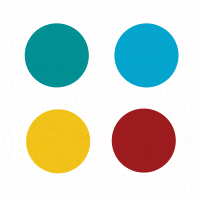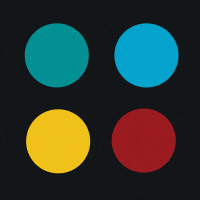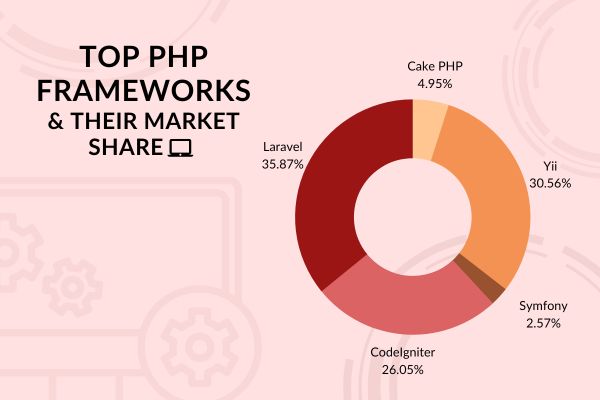




Making a decision about application development for your enterprise can be always a confusing task as it is a huge and time-consuming process in terms of choosing a technology stack, scope defining, team planning, development, testing etc. Mainly choosing a technology stack is a difficult part of getting started with enterprise application development. So here you should not worry because you are not alone. Many enterprises face the same phase!
Laravel can fill the gap easily by bridging every complex turning point with its extensive features and flexibility. And that’s why we consider Laravel as an ideal framework for developing enterprise applications. In this post, we’ll look into all the benefits of Laravel for enterprise applications, as well as how it could transform your development process.
Laravel is an open-source PHP framework based around the Model View Controller architecture pattern created by Taylor Otwell in 2011.
This PHP framework has quickly gained immense popularity over recent years. Offering an expansive set of features and tools designed specifically to facilitate enterprise application development. Its simplicity, elegance, and extensive documentation allow developers to get going quickly building scalable yet maintainable apps.
Laravel for enterprise applications offers features like MVC architecture, Eloquent ORM, Blade templating engine, and robust testing framework that make it an ideal platform. Be it building complex business processes, managing large datasets, or providing access control settings granular enough for individual access points, Laravel is the best choice for the same. It empowers developers to craft powerful yet efficient enterprise apps using this flexible framework.

Source: techjury.net
We can clearly see the market size of Laravel and we can consider Laravel as a promising technology with its market share of 35.87%.
Let’s delve into some key attributes that make Laravel an attractive choice for enterprise application development.
Laravel follows an MVC architectural pattern, which separates application logic into three separate components – Model, View, and Controller. This separation provides better code organization and maintenance while increasing scalability. The Model represents data and business logic while the View handles presentation layer details; finally, the Controller acts as an intermediary between the Model and View components.
Laravel’s intuitive and powerful Object-Relational Mapping (ORM), Eloquent, offers easy database operations by offering an expressive syntax for querying databases. Eloquent lets developers work directly with database tables using PHP objects for increased productivity when performing Create Read Update Delete operations as well as managing relationships between entities.
Laravel’s Blade templating engine offers an effective way of isolating presentation logic from application logic. Blade provides an expressive syntax for writing views, making it simpler to create reusable and modular templates. Furthermore, Blade supports features like template inheritance, sections, and components, which enable developers to build dynamic user interfaces.
Laravel’s routing system makes defining and handling HTTP routes much simpler for developers, providing them with an easily understandable syntax for route definition. Laravel also features caching technology, which enhances app performance by decreasing registration overhead costs.
Laravel comes equipped with an innovative authentication and authorization system out-of-the-box, including features like user registration, login, password reset, and email verification. Highly configurable authentication logic enables developers to define their authentication logic for enterprise apps with Laravel’s assistance. Furthermore, it also offers straightforward ways of handling roles and permissions, making fine-grained access control simpler to implement than with traditional approaches.
Laravel’s flexible caching system makes storing frequently accessed data in various caching stores such as Redis or Memcached easy for developers, helping reduce database loads while speeding up retrieval times for data retrieval. Laravel provides an API that makes caching strategies in enterprise applications simpler to implement.
Laravel provides developers with an intelligent queueing system, which enables them to offload time-consuming tasks onto background workers to improve application responsiveness and manage asynchronously handled tasks. Laravel’s Queuing System supports various queue drivers such as Redis, Beanstalk, and Amazon SQS, which makes its usage scalable and flexible. Additionally, its task scheduler helps schedule repetitive tasks or automate job execution for enhanced enterprise application efficiency.
Laravel boasts an easy and robust testing framework designed to simplify writing automated tests for applications. With unit, integration, and browser tests included in its suite of tools and methods for testing various aspects of applications (unit tests, integration tests, browser tests), Laravel’s testing framework encourages developers to write testable yet maintainable code while guaranteeing enterprise application quality and reliability.
Still, thinking about why Laravel? Below are pointers that can help you with the answers:
Laravel provides developers with an efficient development process, making enterprise application development fast. Its expressive syntax and extensive libraries facilitate writing clean code quickly while decreasing development time and effort. According to the SitePoint survey, respondents voted for Laravel as the top PHP framework, with 58% choosing it for rapid app creation.
Laravel offers built-in protections against cross-site scripting (XSS), cross-site request forgery (CSRF), SQL injection attacks, and SQL injection attacks – security being of utmost importance in application development processes. With features like password hashing encryption two two-factor authentication to protect itself against vulnerabilities, Laravel guarantees its operations will run securely.
Enterprise applications often must accommodate large user bases and high traffic loads, making Laravel an excellent choice to accommodate such requirements. Laravel supports horizontal scaling by enabling developers to distribute applications across multiple servers if necessary and also provides caching, database replication, and load balancing to ensure optimal performance even under heavy loads.
Laravel’s ORM (Object-Relation Mapping), Eloquent, makes database management effortless. Offering an accessible syntax to interact with databases without writing complex SQL queries manually and supporting various database systems seamlessly, Eloquent makes data manipulation and retrieval effortless.
Laravel’s vibrant developer community is one of its main advantages. Regular contributions by this dedicated group include developing packages, writing tutorials, providing forum support, and offering solutions to common development problems – making development faster and simpler overall.
Enterprise applications often necessitate integrations with various third-party services like payment gateways, cloud storage platforms, and email providers. Laravel makes integration easier by offering an API with prebuilt libraries for popular services; Laravel Cashier serves as one such library to seamlessly connect to payment gateways like Stripe and Braintree.
Here we bring you the benefits that come along the Laravel world compared to anything else:
Laravel provides an elegant syntax that is user-friendly for reading and writing code, with expressive features enabling developers to write more readable, maintainable code which reduces development times as well as bugs.
Laravel utilizes an MVC architecture pattern, which separates application logic from presentation for easier management and code reusability. This makes complex applications much simpler to manage while offering improved code organization and reuse.
Laravel’s robust routing system enables developers to easily define SEO-friendly URLs while caching improves application performance by speeding up route resolution times.
Laravel comes equipped with an efficient authentication and authorization system, making user registration, login, and password reset functionality easy to implement. Furthermore, Laravel’s robust authorization framework enables developers to define access control rules based on roles and permissions granularly for greater control.
Laravel’s database migration feature offers developers a way to version control database schema changes, quickly deploy them across environments easily, and seed the database with test data for easy development and testing of applications.
Laravel’s Eloquent ORM (Object-Relational Mapping) allows developers to interact with a database using an easy, intuitive syntax, with its fluent query builder and support for relationships between tables facilitating complex data structures easily.
Laravel’s Blade templating engine provides an effective yet simple means of decoupling presentation logic from application logic, enabling developers to easily build dynamic web pages that include features like inheritance or control structures for easy page building and responsive design.
Laravel’s Artisan CLI is an invaluable way to automate common development tasks with just a few keystrokes – such as code generation, running migrations, or clearing caches.
Whilst PHPUnit does support unit tests out-of-the-box and provides a fluent API, Laravel’s testing framework makes writing unit tests an effortless part of development processes. It supports PHPUnit out of the box while offering an intuitive API for HTTP requests and response testing.
Laravel boasts an engaged community of developers that contributes to its development while offering support through forums, chat rooms, and tutorials. This vibrant network ensures Laravel remains up-to-date with web development trends and best practices.
Laravel provides developers with built-in support for localization and internationalization, translating into other languages simple. Helper functions exist for working with language files as well as fallback support allowing multilingual applications to be created with ease.
Laravel’s task scheduling feature makes automating repetitive tasks easy, such as sending emails or producing reports. With its user-friendly syntax for scheduling scheduled tasks and support for various types of schedules, such as cron expressions, Laravel provides developers with a robust set of automation features.
Laravel features an outstanding error and exception handling system to easily identify and address errors in your application. Featuring detailed error messages, log capabilities, and customizable error pages. This makes it simple for debuggers and developers alike to identify and resolve problems more efficiently.
So, Laravel is an extremely useful framework for enterprise application development. With robust features that enhance scalability, security, and performance, this framework makes an excellent choice for businesses seeking powerful yet efficient software solutions. Laravel simplifies development via elegant syntax and extensive libraries, which make creating complex apps simple. Furthermore, its active community and large ecosystem provide plenty of resources and support to companies throughout both the development and maintenance stages of an app’s lifecycle. All things considered, Laravel represents the perfect combination of functionality and flexibility and serves businesses well when developing enterprise apps.
If your enterprise needs such enterprise web app solutions for business automation, KrishaWeb is one stop solution with the vast experience of developing scalable enterprise solutions. Feel free to give us a shoutout and one of our consultants will get back to you for discussing your idea.
Subscribe to our newsletter and learn about the latest digital trends.